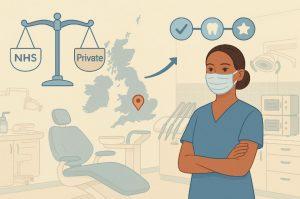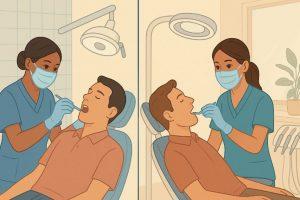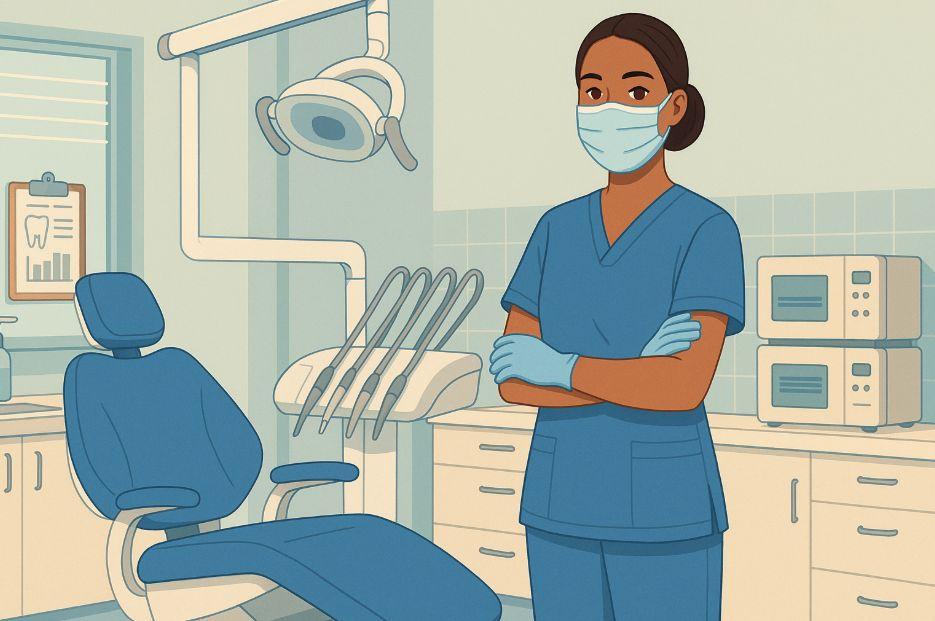In the healthcare sector, dental nurses serve a crucial role, supporting dentists during clinical procedures and helping patients feel at ease. As this profession continues to grow in demand, many people are curious about what financial rewards it brings. So, what is the average dental nurse salary in the UK, and what factors influence how much one can earn in this field?
What Factors Influence a Dental Nurse’s Salary in the UK?

Several elements play a role in determining how much a dental nurse earns. One of the most significant is whether the role is within the NHS or in a private dental practice.
NHS salaries follow a structured pay band system, typically starting at Band 3 for entry-level positions and rising with qualifications and responsibilities. Meanwhile, private practices often offer salaries based on experience and may include performance-based incentives.
Location is another major factor. In cities like London, mental health nurses typically earn more, reflecting both the heightened living expenses and demand for skilled professionals. Experience also plays a vital role those with several years in the profession or specialist training can command higher salaries than those just entering the field.
How Much Does a Dental Nurse Earn When Starting Out?
Entry-level dental nurses working under the NHS generally earn salaries starting between £19,000 and £22,000 annually. These salaries reflect Band 3 rates and may vary slightly depending on geographic location and the specific healthcare trust. In private practices, starting salaries are often similar but can vary more significantly based on the practice’s size and clientele.
Those beginning as apprentices or trainees usually earn less but gain practical experience and study support, setting a strong foundation for salary growth. Once a dental nurse becomes fully qualified, opportunities to specialise or progress into senior roles can lead to notable pay increases over time.
What is the Average Salary for a Dental Nurse in London?
Dental nurses based in London often receive higher pay than those working in other UK regions, due to the city’s cost of living and demand. Salaries in the capital often range from £27,000 to £32,000 annually, which is noticeably higher than the national average. This increase is largely due to the city’s elevated living costs and a higher concentration of private clinics, which may pay more to attract skilled professionals.
Additionally, the NHS offers a London Weighting Allowance, which boosts earnings for healthcare workers based in the city. This extra pay typically adds up to a few thousand pounds annually, helping to offset the higher cost of living in London.
How Do NHS Dental Nurse Salaries Compare to Private Sector Roles?

The NHS provides dental nurses with a clearly defined salary structure through its pay band system. Typically, dental nurses begin their careers within Band 3 pay scales, earning between £22,000 and £24,000 depending on their placement. More experienced nurses may progress to Band 4 or Band 5, where earnings can reach over £30,000.
In contrast, salaries in private practices can vary more widely. While some private clinics may offer base salaries similar to those in the NHS, others particularly in affluent areas or specialist practices may provide higher compensation.
Private roles may also come with performance-related bonuses, flexible scheduling, or other perks not commonly found in NHS positions. However, they often lack the long-term pension benefits and annual leave entitlements associated with NHS employment.
What is the Hourly Rate for Dental Nurses in the UK?
The average hourly wage for a dental nurse typically ranges from £10 to £16, depending on experience, location, and sector. Entry-level nurses often earn around £10.50 to £11.50 per hour, while more experienced professionals can earn closer to £14 or £15.
Part-time roles may offer slightly higher hourly rates to account for flexible hours or evening and weekend work. In London and other high-demand regions, dental nurses often benefit from even higher hourly wages, especially in private clinics.
How Does Experience Affect a Dental Nurse’s Income?
Experience is a key driver of salary progression in the dental nursing field. A dental nurse with just one or two years of experience may earn in the low £20,000s, but with three to five years under their belt, that figure can rise to £26,000 or more. Those in senior or specialised roles, such as orthodontic or sedation nurses, often earn between £28,000 and £35,000.
Progression doesn’t only depend on years in the role additional qualifications and certifications can significantly boost a dental nurse’s earning potential. Positions such as team leader, practice manager, or treatment coordinator are common advancement opportunities, all of which come with higher pay and added responsibility.
How Does Dental Nurse Training Impact Salary Potential?

Training is essential for any dental nurse looking to grow professionally and financially. Completing a recognised qualification, such as the NEBDN National Diploma or a Level 3 Diploma in Dental Nursing, is usually a minimum requirement for most roles. These qualifications not only increase employability but can also lead to higher starting salaries.
Beyond initial qualifications, continuous professional development (CPD) is highly encouraged in the field. Courses in radiography, oral health education, and sedation can open doors to specialist roles that come with higher pay.
Many employers particularly within the NHS support ongoing training through funded courses or study time, allowing nurses to upskill without sacrificing income.
Are There Regional Differences in Dental Nurse Salaries Across the UK?
There are noticeable regional disparities when it comes to dental nurse salaries. In general, professionals working in London and the South East earn the most, reflecting the region’s higher cost of living. Salaries in cities like Manchester, Birmingham, and Bristol are typically slightly below London rates but still competitive.
In more rural areas or regions such as Wales, Northern Ireland, and parts of Scotland, dental nurse salaries tend to be lower, ranging from £22,000 to £25,000. However, these areas often offer a better work-life balance and lower living costs, which can offset the difference in take-home pay.
What Benefits and Bonuses Can Dental Nurses Expect?
NHS dental nurses enjoy a range of employee benefits, including a generous pension scheme, paid annual leave (27–33 days depending on length of service), and paid sick leave. Additional benefits may include maternity and paternity leave, career development support, and structured progression pathways.
Private practices, while not offering the same formal benefits, may attract nurses with bonuses, profit-sharing schemes, and flexible working conditions. Some private employers also provide discounted dental care, wellness packages, and in-house CPD opportunities, making them appealing to nurses seeking more immediate financial rewards.
How Does the Future Look for Dental Nurse Salary Growth in the UK?

The outlook for dental nurse salary growth in the UK is positive. The increasing demand for dental services, combined with a focus on preventative care, means that skilled dental nurses are more essential than ever. As the profession evolves, there’s likely to be a growing need for specialised roles, particularly in cosmetic, orthodontic, and surgical dentistry.
Those who invest in training and stay current with the latest techniques and technologies will likely find themselves well-positioned for promotions and pay rises. With clear career pathways into roles such as practice management or even teaching and training, the dental nursing field offers both job security and upward mobility for those dedicated to their profession.
How Does Dental Nurse Pay Vary by Experience, Sector, and Region?
While general salary ranges give a broad picture, a more detailed comparison helps aspiring and current dental nurses understand exactly where they stand or where they could be. Salaries can differ greatly depending on how long someone has been in the profession, whether they work for the NHS or a private practice, and where they are located in the UK.
Here’s a comprehensive look at typical dental nurse pay levels:
| Experience Level | Sector | Region | Estimated Annual Salary | Notes |
| Trainee (Apprentice) | NHS/Private | UK-wide | £15,000 – £19,000 | Often includes training support and lower pay |
| Entry-Level (0–2 yrs) | NHS (Band 3) | Nationwide | £19,000 – £22,000 | Standard Band 3 salary, varies slightly by region |
| Entry-Level | Private | Regional (Non-London) | £20,000 – £23,000 | May be higher with qualifications |
| Mid-Level (3–5 yrs) | NHS (Band 4) | Nationwide | £23,000 – £26,000 | Often includes more responsibilities |
| Mid-Level | Private | London & Major Cities | £26,000 – £30,000 | Varies based on clinic type and role |
| Senior (5+ yrs) | NHS (Band 5+) | Nationwide | £27,000 – £32,000 | May include team lead duties |
| Senior Specialist | Private | London / Affluent Areas | £32,000 – £38,000+ | High for roles in orthodontics, sedation, or leadership |
| Practice Manager | NHS/Private | UK-wide | £35,000 – £45,000+ | Requires management experience and additional training |
This table illustrates how progression, location, and employment type all contribute to overall earning potential. For example, a mid-career dental nurse working in a private orthodontic clinic in London could earn significantly more than one in a rural NHS setting.
Understanding where you fall on this scale can help guide your career goals, whether that’s seeking promotions, switching sectors, or relocating for higher pay.
Conclusion
While the dental nurse salary in the UK may start modestly, it offers consistent growth, especially for those who pursue additional training and gain experience. NHS positions provide long-term stability and benefits, while private sector roles can offer faster salary increases and performance-based rewards.
In London and other high-demand regions, the earning potential is even greater. For those passionate about dentistry and patient care, dental nursing remains a financially viable and fulfilling career choice.
FAQs About Dental Nurse Salary in the UK
What is the highest salary a dental nurse can earn in the UK?
Experienced dental nurses in senior roles can earn upwards of £35,000, particularly in private practices or leadership positions.
Is it better to work as a dental nurse in the NHS or private sector?
The NHS offers stability and excellent benefits, while private practices may provide higher pay and more flexibility, especially in London.
Do dental nurses get paid more in London?
Yes, London-based dental nurses often earn more due to the cost of living and demand. The London Weighting Allowance also boosts NHS salaries.
Can dental nurses receive bonuses or overtime pay?
In private practice, yes. NHS dental nurses have fixed salaries but may receive additional pay for unsociable hours or overtime in certain roles.
Are there part-time opportunities with competitive pay?
Many practices offer part-time roles, and hourly rates can be competitive, especially if flexibility or specific skills are required.
Does training affect how much a dental nurse earns?
Absolutely. Additional qualifications in radiography, sedation, or orthodontics can lead to higher salaries and more specialised positions.
Is there career growth for dental nurses in the UK?
Yes, with clear paths into team leadership, practice management, or specialist roles, dental nursing offers solid long-term career prospects.









Leave feedback about this